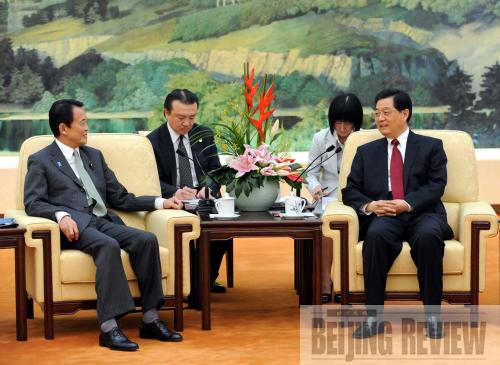|
 |
|
BILATERAL TALKS: Chinese President Hu Jintao (right) exchanges views with visiting Japanese Prime Minister Taro Aso (left) on April 30 in Beijing (HUANG JINGWEN) |
Japanese Prime Minister Taro Aso paid a visit to China on April 29-30, during which he expressed his confidence in the future of the Sino-Japanese relationship. He said that since cooperation between Japan and China had been developing steadily in every area, he no longer saw the need for analogies to the seasons in discussing bilateral relations.
People are now fairly optimistic about the future of Sino-Japanese relations. Both sides realize that only cooperation can push forward each country's development and prosperity, which will also promote peace and prosperity in Asia as a whole. But there are also chances for friction between the two countries because of differences in national interests, histories, cultures and traditions.
Bright future
In recent years, Japanese researchers have held many discussions on the topic of national interests. As a result, more and more Japanese realize the country's diplomacy should be based on what is good for Japan. As famous American historian and diplomat Edwin O. Reischauer pointed out, Japan relies on foreign trade more than other countries do, giving it a higher stake in a peaceful world and open markets. Therefore, its relations with China should have a rational and solid basis. Peace will bring benefits to both China and Japan, while confrontation can only do them harm. Developing the bilateral relations is thus in line with the two countries' national interests, and the idea is gaining wider support among people on both sides.
Today's world faces three major threats—the global financial crisis, environmental degradation and epidemic diseases. All countries, especially major powers, should enhance coordination rather than clash with each other, so as to deal with the common challenges they face. The question before China and Japan, a pair of neighbors, is no longer whether to coordinate, but how to coordinate, due to their common interests in protecting the environment. Seeking common ground is playing a bigger role in developing bilateral relations.
During the Bush and Obama administrations, the Sino-U.S. relationship has overall been steady. Although Japanese experts differ on whether the improved Sino-U.S. relationship will benefit Japan, they agree on the need to seek balanced Sino-U.S.-Japanese ties and push forward a trilateral strategic dialogue. It seems likely that, in the foreseeable future, the U.S.-Japanese alliance will remain largely unchanged, while the improved Sino-U.S. relations might lead to an improved Sino-Japanese relationship as well.
For a long time, historical issues and the Taiwan question have been the two complex issues influencing Sino-Japanese ties. Now the improving cross-straits ties is also warming up Sino-Japanese relations, because an important purpose of the U.S.-Japanese military alliance is for the two sides to step in should there be conflict across the Taiwan Straits. Since the current U.S. administration has expressed its desire for improved cross-straits relations, scholars believe Taiwan will become a less sensitive issue in Sino-U.S. relations. As the possibility of war between China and the United States over "Taiwan independence" grows dimmer, so does the potential for a Sino-Japanese clash. The Taiwan question will be a weaker threat to the Sino-Japanese relations.
The current global financial turmoil and economic recession, which was triggered by the U.S. sub-prime mortgage crisis, has raised questions about free and indulgent capitalism and the capitalist model. Japan's capitalist model of development has influenced many developing countries in Asia, including China. In its opening-up policy, China has been careful to learn from Japan's development after World War II. But the global financial crisis has made Asian countries realize that they should develop a development model that benefits not just one country, but the whole region. China became Japan's top trade partner in 2007. Meanwhile, the Japanese economy has become more oriented toward the Asian economy. By jointly revitalizing Asian development, China and Japan can be strong partners rather than adversaries.
Challenges ahead
There are many reasons to feel optimistic about the future of Sino-Japanese relations, but there are also problems the two countries should pay more attention to, before they may block the development of bilateral ties.
|
